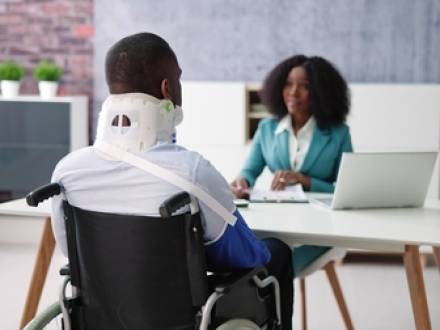Recent Blog Posts
California Firefighters and PTSD
 As a society, we depend on firefighters to keep us safe. They are called on to help in many situations: fires, serious car crashes, and construction collapses, to name a few. Firefighters go to work every day to save people whose lives are in danger, and in doing so, they put themselves at risk, too. Unfortunately, because of the nature of their work, firefighters face a high risk of serious injury, whether physical, mental, or emotional. Like all employees in California, firefighters are also entitled to workers’ compensation to cover the costs of these injuries, but the red tape involved in proving their injuries, specifically nonphysical injuries like PTSD, can feel like an uphill battle. If you are a firefighter who has been injured in any way while doing your job, speak with an experienced Hollister, CA workers’ compensation lawyer who can help you navigate the complicated process and guide you on how to move forward.
As a society, we depend on firefighters to keep us safe. They are called on to help in many situations: fires, serious car crashes, and construction collapses, to name a few. Firefighters go to work every day to save people whose lives are in danger, and in doing so, they put themselves at risk, too. Unfortunately, because of the nature of their work, firefighters face a high risk of serious injury, whether physical, mental, or emotional. Like all employees in California, firefighters are also entitled to workers’ compensation to cover the costs of these injuries, but the red tape involved in proving their injuries, specifically nonphysical injuries like PTSD, can feel like an uphill battle. If you are a firefighter who has been injured in any way while doing your job, speak with an experienced Hollister, CA workers’ compensation lawyer who can help you navigate the complicated process and guide you on how to move forward.
Understanding Apportionment in California Workers’ Compensation
 While most California employees are entitled to workers’ compensation to cover the costs of injuries they suffer at work, there are guidelines and limitations to the compensation they can receive. If someone had a preexisting condition or some other underlying issue at the time they got hurt, that can impact the amount of compensation they are awarded. Apportionment is a calculation explaining how much of someone’s injury was caused by a workplace incident. If you were hurt and need to prove how much of your injury was the result of something that happened at your job, speak with a skilled Morgan Hill, CA workers’ compensation attorney to learn more.
While most California employees are entitled to workers’ compensation to cover the costs of injuries they suffer at work, there are guidelines and limitations to the compensation they can receive. If someone had a preexisting condition or some other underlying issue at the time they got hurt, that can impact the amount of compensation they are awarded. Apportionment is a calculation explaining how much of someone’s injury was caused by a workplace incident. If you were hurt and need to prove how much of your injury was the result of something that happened at your job, speak with a skilled Morgan Hill, CA workers’ compensation attorney to learn more.
How is Apportionment Calculated in California?
Since injuries can be caused by several factors, many workers’ compensation cases include the need to determine apportionment, which is the portion of an injury that can directly be attributed to work. If an injury was the result of several factors, the employer will not be solely responsible for compensating the injured employee. Because this can have significant implications for the permanent disability compensation you might be entitled to, your employer needs to meet strict standards before they can seek lesser compensation.
3 Tips for Returning to Work After a Work Injury
 If you were injured at work and are receiving workers’ compensation benefits in California, you might wonder what happens when it is time to go back to your job. Returning to work after an injury can be challenging, but understanding the process can help make it smoother. This article will offer information about returning to work after a workers' compensation injury. If you have more questions, speak with an experienced Hollister, CA workers’ compensation attorney who can explain further.
If you were injured at work and are receiving workers’ compensation benefits in California, you might wonder what happens when it is time to go back to your job. Returning to work after an injury can be challenging, but understanding the process can help make it smoother. This article will offer information about returning to work after a workers' compensation injury. If you have more questions, speak with an experienced Hollister, CA workers’ compensation attorney who can explain further.
What to Do When You Are Ready to Return to Work
Before you can go back to work after being awarded workers’ compensation benefits, there are some important steps to take. If you decide on your own that you are ready to return and you show up one day without preparing anyone in advance, it could cause setbacks that keep you from resuming your real routine. You might go to work before you are fully able or before your workplace is ready for you. There are ways to avoid making those mistakes.
President Biden’s Proposal on Extreme Heat and Workers’ Compensation
 There are many different ways workers can be injured at their jobs. Whether they are injured due to faulty equipment, insufficient training, or an unsafe work environment, they are generally entitled to workers’ compensation benefits. These are intended to cover the costs of recovering from work-related injuries. Recently, President Biden submitted a proposal to increase protections for people who work in extremely hot conditions. This is especially relevant here in California, where extreme heat is a serious concern for many workers. If you have questions about whether your workplace is following the rules, speak with a knowledgeable Gilroy, CA workers’ compensation attorney to find out more.
There are many different ways workers can be injured at their jobs. Whether they are injured due to faulty equipment, insufficient training, or an unsafe work environment, they are generally entitled to workers’ compensation benefits. These are intended to cover the costs of recovering from work-related injuries. Recently, President Biden submitted a proposal to increase protections for people who work in extremely hot conditions. This is especially relevant here in California, where extreme heat is a serious concern for many workers. If you have questions about whether your workplace is following the rules, speak with a knowledgeable Gilroy, CA workers’ compensation attorney to find out more.
What Is in the New Proposal?
It can be dangerous to work in extreme heat. You could suffer serious health issues like heat exhaustion, heat stroke, or dehydration. These conditions can be life-threatening and can seriously affect your health and safety. President Biden’s new proposal is designed to protect workers from these risks by setting stricter rules about working in hot environments.
Workers' Compensation Claims for California Hospital Workers
 Employees in every industry face different risks of injury and harm based on the nature of their work. Hospital workers are no exception and are entitled to workers’ compensation when they are hurt. They face a significant risk of getting injured at work, especially because they deal with diseases and hazardous materials and need to medicate and even lift sick patients. If you got hurt while at your hospital job, speak with a qualified San Benito County, CA workers’ compensation attorney who can help you navigate the claims process and advocate for maximum compensation.
Employees in every industry face different risks of injury and harm based on the nature of their work. Hospital workers are no exception and are entitled to workers’ compensation when they are hurt. They face a significant risk of getting injured at work, especially because they deal with diseases and hazardous materials and need to medicate and even lift sick patients. If you got hurt while at your hospital job, speak with a qualified San Benito County, CA workers’ compensation attorney who can help you navigate the claims process and advocate for maximum compensation.
Common Injuries Among Hospital Workers
Hospital workers are at risk for facing many types of injuries, due to the unique nature of the work they do. Some of these are:
- Musculoskeletal injuries: Lifting, transferring, and repositioning patients can lead to back strains, shoulder injuries, and other disorders.
Workers’ Comp for Carpal Tunnel When Working From Home
 Not so long ago, it was safe to assume that you could find a typical full-time employee in her office from Monday to Friday. You could expect to sit in your designated workspace for about 40 hours per week. While some more flexible companies have offered hybrid and remote arrangements for years, the COVID-19 global pandemic drastically changed how employers and employees think about work. Nowadays, it is almost surprising when someone needs to go into their office every day that they work.
Not so long ago, it was safe to assume that you could find a typical full-time employee in her office from Monday to Friday. You could expect to sit in your designated workspace for about 40 hours per week. While some more flexible companies have offered hybrid and remote arrangements for years, the COVID-19 global pandemic drastically changed how employers and employees think about work. Nowadays, it is almost surprising when someone needs to go into their office every day that they work.
Office workers are generally eligible for workers’ compensation for injuries and conditions like carpal tunnel syndrome (CTS). What happens when you develop a condition like that while working from home? If you have a hybrid or fully remote job and were injured at home while working, speak with a seasoned Gilroy, CA workers’ compensation lawyer who can explain your options.
Can I Get California Workers’ Compensation for Workplace Stress?
 Most workers are aware they are entitled to receive workers’ compensation benefits following a workplace injury or illness. In some states, a worker whose job has caused them emotional or mental trauma, including stress, anxiety, PTSD, and depression, can also receive workers’ compensation benefits.
Most workers are aware they are entitled to receive workers’ compensation benefits following a workplace injury or illness. In some states, a worker whose job has caused them emotional or mental trauma, including stress, anxiety, PTSD, and depression, can also receive workers’ compensation benefits.
Some states do not allow workers’ compensation benefits for mental trauma under any circumstances, while others may require an accompanying compensable physical injury. Although a psychological workplace injury may be allowed in some states, it will be denied when the injury results from a good-faith disciplinary action. California allows workers’ compensation claims for mental health issues when the worker has sufficient evidence to prove the issue is work-related.
Mental health issues are just as real as physical injury and trauma. When a work situation has been so toxic that conditions like stress, anxiety, and depression result, workers’ compensation should cover necessary treatments and time away from work. Having an experienced Hollister workers’ compensation attorney to answer questions and act as a guide throughout the process is essential. A skilled workers’ compensation attorney will ensure the worker’s rights are fully protected throughout the claim process.
Are Construction Workers Entitled to Workers’ Compensation?
 Wages and benefits resulting from a job are meant to provide workers with economic stability and insurance coverage in the event of a workplace accident. Every state except Texas mandates that employers must carry workers’ compensation insurance. Yet many employers try to circumvent these rules by misclassifying employees as independent contractors.
Wages and benefits resulting from a job are meant to provide workers with economic stability and insurance coverage in the event of a workplace accident. Every state except Texas mandates that employers must carry workers’ compensation insurance. Yet many employers try to circumvent these rules by misclassifying employees as independent contractors.
This misclassification deprives workers of core rights and protections while shifting costs and risks to workers who may barely be getting by financially. It is estimated that between 10 and 30 percent of all employees are misclassified as independent contractors.
Construction workers are often misclassified as independent contractors, even though they meet virtually none of the requirements. Following a workplace accident on a construction site, a construction worker may be told they are not covered by workers’ compensation.
How Do You Apply for a Workers' Comp Appeal?
 Trying to navigate California's workers' compensation system can be challenging, especially when your initial claim is denied. Understanding the appeal process is crucial for protecting your rights and securing the benefits you deserve. A California lawyer will walk you through the steps of applying for a workers' compensation appeal.
Trying to navigate California's workers' compensation system can be challenging, especially when your initial claim is denied. Understanding the appeal process is crucial for protecting your rights and securing the benefits you deserve. A California lawyer will walk you through the steps of applying for a workers' compensation appeal.
Find Out the Reason for Denial
Before initiating an appeal, review the denial letter carefully. Common reasons for denial include:
- Missed deadlines.
- Disputes over the injury's work-relatedness.
- Insufficient medical evidence.
- Employer contestation of the claim.
Identifying the specific reason for denial will help you prepare a stronger appeal.
The Appeal Process
The appeal process begins with filing an Application for Adjudication of Claim with the Workers' Compensation Appeals Board (WCAB). This form officially opens your case with the WCAB. File it within one year of your injury date or last benefits payment, and submit it to the WCAB office in the county where you live or where the injury occurred. Include all relevant documentation, such as medical reports and employment records.
Discrimination in Workers’ Compensation Claims
 Discrimination in workers’ compensation claims is a serious issue that can have significant consequences for injured workers. If you believe that you have been subjected to discrimination during the process of filing a workers’ compensation claim in California, it is helpful to understand your rights and take appropriate action. A California lawyer can guide you in recognizing discrimination in your case and the steps you can take to protect your rights.
Discrimination in workers’ compensation claims is a serious issue that can have significant consequences for injured workers. If you believe that you have been subjected to discrimination during the process of filing a workers’ compensation claim in California, it is helpful to understand your rights and take appropriate action. A California lawyer can guide you in recognizing discrimination in your case and the steps you can take to protect your rights.
How to Recognize Discrimination in Your Case
Discrimination in workers’ compensation claims can take many forms. Some common examples include:
- Denial of benefits based on race, gender, age, or other protected characteristics
- Retaliation for filing a claim, such as demotion, termination, or harassment
- Falling short in providing reasonable accommodations for a disability resulting from a work-related injury








